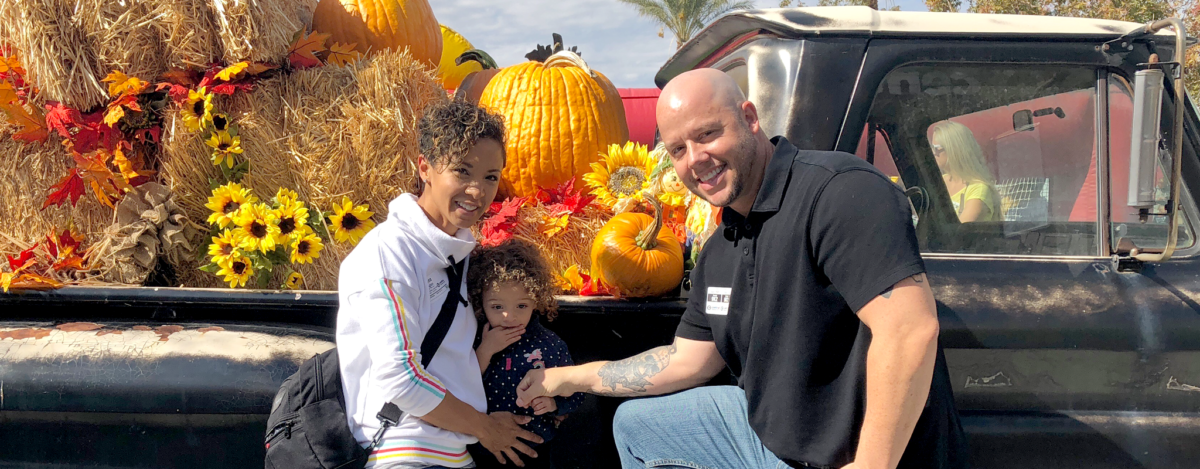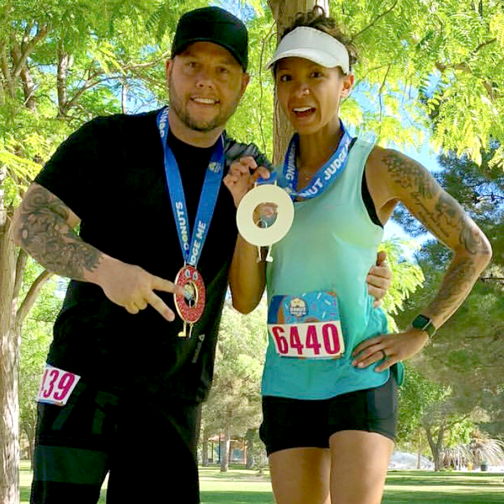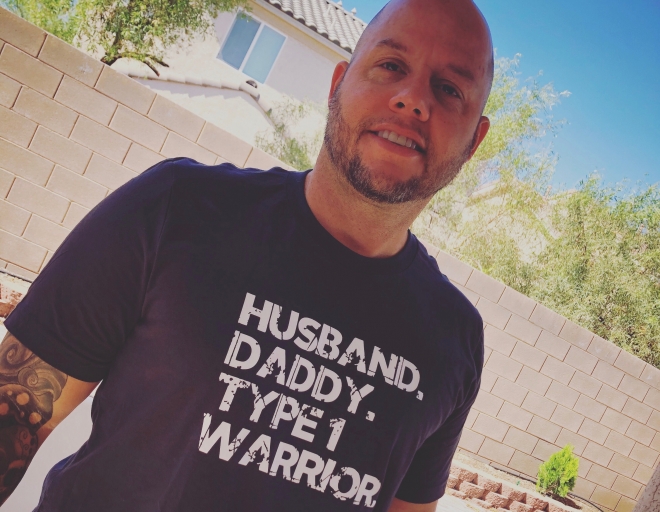Runner Spotlight: Gary and Katrina Pilkington
Editor’s Note: Gary and Katrina were members of Beyond Type Run‘s 2018 TCS New York City Marathon Team sponsored by Dexcom and Insulet, makers of the tubeless Omnipod Insulin Management System. Learn more about the 2019 Beyond Type Run team here.
 How do you manage your diabetes while training?
How do you manage your diabetes while training?
Gary: I use my Dexcom G6 and I use an Omnipod. There have been times when I have reverted and not used the pod, but right now it just seems to be what works best for me. The G6 is recent because I just got it, but I’ve been using the G5 for the last couple of years, and the Omnipod system I’ve been using on and off for about four years.
Katrina: I was monitoring his blood sugars at one point, and then it started to stress him out. I would text or call and say things like “you’re blood’s running low, you need to have a snack”—What I had to understand as far as being a good partner, is it’s still his issue, but I’m his advocate. So when we are together, we joke that I’m his diabetic dog, because I can look at him and tell when he’s high or low. But while he’s running I just stay clear and let him do his thing and I’ll just prep fuel beforehand.
How long have you been running?
G: Growing up I’d always played sports, so running was an integral part of that. For certain sports it required more endurance-type training, so I did that, but as an adult I really didn’t run that much. I did the typical 5k stuff and had some fun, and I would occasionally run just a couple of minutes in my weight training, but really it was Kat that did a lot more of the endurance-type running, the long distance stuff. I’m definitely not a runner by nature.
Have you always run with a continuous glucose monitor (CGM)?
G: In my past races I wasn’t wearing a CGM, and it was definitely less than desirable. I had to figure out a way to test without interrupting what I was doing. When I ran the 5k or 10k, I would just make sure I fueled and that I made it back before I had any kinds of lows. I definitely didn’t have the security that I have now, and confidence in knowing that, hey, the Dexcom’s gonna let me know if I’ve got an issue I need to correct. The Omnipod helps as well—I can control it easily if I want to bolus or adjust my basal.
Have you ever been to NYC?
G: Yeah I’ve been to visit, but never to run. We’ve taken a couple of family trips there, but I’ve never actually done the marathon or anything like that. It’s just been weekend trips, that kind of thing.
K: Oh, yeah. It’s one of my favorite places to visit. I said that if I were to ever run another marathon, it would be New York. So I’m a little jealous that he’s running it. But, I get to go see it, and then go work out.
When did you learn about Type 1 diabetes?
K: I didn’t know a lot about it type 1 diabetes until I met Gary. Then we were dating, and I started noticing after every meal he would disappear, or he would have something in his pocket. I didn’t quite understand what was happening. He was pretty secretive. He could pick up that I could tell something was up, and told me. In the beginning, I didn’t really learn a lot about it. I just thought it was his issue, until it started impacting us. He would be either low or high, and I had to make a decision to either understand it, or make it worse, which is why I wrote an article for Beyond Type 1 about being a good partner.
Tell me about your decision to run with Beyond Type 1.
G: Back when I was just exercising and weight training, I always felt like I was on an island, so to speak, and didn’t share anything about my diabetes. Even if I was doing great in whatever I was doing, it was just that I didn’t share that part of my life. Looking back, having the opportunity to be part of a team and be more open and honest and share, I think it’s giving me a chance to help people that might feel alone, especially people who are newer to their prognosis, being diagnosed with type 1 diabetes. It’s really crazy because over the years, I’ve seen things gradually change—10 or 15 years ago, social media wasn’t what it is now, and I think Beyond Type 1 has just done an amazing job of making diabetes something that doesn’t have as negative a connotation as it had previously.
K: I think I found Beyond Type 1 through social media because I’ve been a blogger since 2012, so I’m always online checking things out and I remember I was looking for articles about being a good partner with kids and stuff like that, and I stumbled across Beyond Type 1. And then when I shared it with my husband. I enjoyed the fact that Beyond Type 1 was really good about catering to an adult audience, educating, informing, keeping it fun, keeping it right, keeping it current,and I think that was important to me. Gary was diagnosed at 23, and I have a couple of friends whose husbands were diagnosed at 40-something years old.
Will you run any more marathons after this?
G: I’m undoubtedly gonna do another one. This one was a bucket list item for me, just running a marathon was something that I’d always said I wanted to do. I’m built more for speed than distance and everything. I would definitely at least do one more full. I would love to.
What advice do you have for others affected by Type 1 diabetes?
G: If you’re working out by yourself you’ve gotta be diligent about making sure that you’re properly fueling before and after, and then be vigilant with testing and monitoring where you’re at. If you’re working out with a partner, or you’re running with a group or someone else, just let those people around you know, because everybody can kind of be in tune if for example your blood sugar’s dipping a little bit. We need to make sure we correct.
K: For partners, I would always just say approach with kindness. Make sure you’re kind and being supportive and even asking your partner, “What do you need from me? What do you need from me to be supportive, so that I can be there to help you?” while navigating that line between not doing too much and not doing enough.
To learn more about the 2019 TCS New York City Marathon Beyond Type Run team click here.


 How do you manage your diabetes while training?
How do you manage your diabetes while training?



